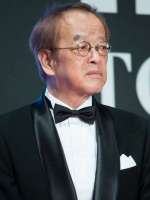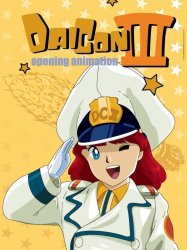Kōichi Sugiyama is a Sound Japonais born on 11 april 1931 at Tokyo (Japon)
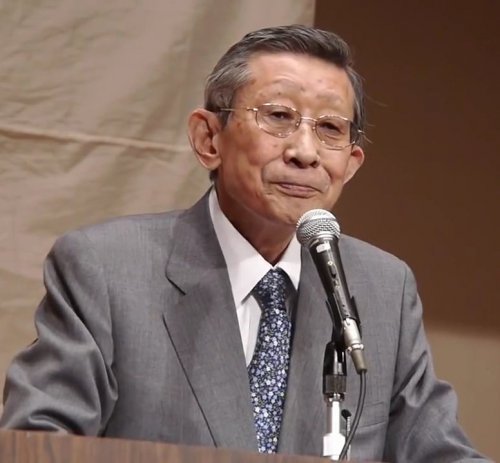
Koichi Sugiyama (すぎやま こういち, Sugiyama Kōichi, born April 11, 1931 as 椙山 浩一, which is pronounced the same as his stage name) is a Japanese music composer, council member of JASRAC (Japanese Society for Rights of Authors, Composers, and Publishers), board member of Japan Institute for National Fundamentals, and honorary chairman of the Japanese Backgammon Society. He is best known for composing music for the Dragon Quest video game series, which is published by Square Enix, and several Japanese anime, film, and TV shows, such as Space Runaway Ideon, Godzilla vs. Biollante, Cyborg 009, and Gatchaman.
A classically trained conductor, he is considered a primary inspiration for other game music composers such as Nobuo Uematsu, and has been referred to as a "Big boss of game music."
Koichi Sugiyama was born in Tokyo, Japan. While growing up, Sugiyama's home was filled with music, which ultimately inspired his passion. In high school, he began to recognize his passion, and wrote various small musical works.
After graduating from the University of Tokyo with full honours in 1958, he went into the reporting and entertainment sections of cultural broadcasting. In addition, he joined the Fuji Telecasting Co. as a director. In 1965, he left the telecasting company as a freelance director, and in 1968, he quit directing and concentrated on music composition.
During the late 1970s and early 1980s, Sugiyama composed for musicals, commercials, pop artists, and for animated movies and television shows, such as Kagaku Ninja Tai Gatchaman, The Sea Prince and the Fire Child, and Cyborg 009. He also assisted Riichiro Manabe with the composition for Godzilla vs. Hedorah, composing the record single of the soundtrack, and conducting for some of the tracks.
Dragon Quest and video game career
Sugiyama's first contact with Enix was by a fan letter he wrote them regarding a PC shogi game in the early 1980s. After Enix's staff overcame the shock of receiving a handwritten postcard from a celebrity of Sugiyama's stature, they were so impressed by his depth of knowledge and appreciation of games that they decided to ask Sugiyama to write the music for Dragon Quest.
Sugiyama started composing for the PC-8801, and was working for Enix at the time. His first video game composition was for the game Wingman 2. In 1986, he composed for his second video game, Dragon Quest, for the Famicom. Dragon Quest would become the series he was most known for. Sugiyama says it took him five minutes to compose the original opening theme. His classical score for the game was considered revolutionary for console video game music.
Sugiyama was the first video game composer to record his video game music with a live orchestra. In 1986, the CD, Dragon Quest I Symphonic Suite, was released, utilizing the London Philharmonic Orchestra to interpret Sugiyama's melodies. The soundtrack's eight melodies (Opening, Castle, Town, Field, Dungeon, Battle, Final Battle, and Ending) set the template for most role-playing video game soundtracks released since then, hundreds of which have been organized in a similar manner.
In 1987, he composed for Dragon Quest II, and then held the very first video game music concert in the world. "Family Classic Concert" was arranged and conducted by Sugiyama himself. It was performed by the Tokyo String Music Combination Playing Group on August 20, 1987 at Suntory Hall, Tokyo, Japan. "Dragon Quest I Symphonic Suite" and "Dragon Quest II Symphonic Suite" were performed. The "Family Classic Concerts" have always had excellent turn outs; since then, Sugiyama has held over eighteen of them all across Japan.
Sugiyama continued to compose for video games from 1987 to 1990. In 1991, he introduced a series of video game music concerts, five in all, called the Orchestral Game Concerts, which were performed by the Tokyo City Philharmonic Orchestra and Tokyo Symphony Orchestra. The performances included over eighteen different video game composers, such as Koji Kondo, Yoko Kanno, Kentarō Haneda, Nobuo Uematsu, Keiichi Suzuki, as well as Sugiyama himself. These concerts were held from 1991 to 1996; during this time, Sugiyama composed for other video games and arranged for some of them to be performed in the Orchestral Game Concerts.
In September 1995, Sugiyama composed the Dragon Quest Ballet. It premiered in 1996, and returned in 1997, 1999, 2001, and 2002. During those years, he also released the Symphonic Suites for the Dragon Quest games he had worked on thus far.
Later career
Sugiyama also has completed other projects, such as the fanfares for the opening and closing of the gates in the Tokyo Race Track and the Nakayama Race Track.
Koichi Sugiyama's non-work related hobbies include photography, traveling, building model ships, collecting old cameras, and reading. He has opened a camera section on his website, and he also has his own record label "SUGI Label" which he started on June 23, 2004.
In late 2004, he finished and released the Dragon Quest VIII: Journey of the Cursed King Original soundtrack, and the Dragon Quest VIII Symphonic Suite.
In 2005, Sugiyama was holding a series of concerts in Japan with the Tokyo Metropolitan Symphony Orchestra with music from Dragon Quest VIII, as well as his classic compositions from the past. In August 2005, his music from Dragon Quest was performed live at the European Symphonic Game Music Concert. There, for the first time, his music was presented in a live symphonic concert outside Japan.
In 2006, Sugiyama began working on some diverse projects, one of them being the music for Dragon Quest Swords: The Masked Queen and the Tower of Mirrors. On August 19, 2006, Sugiyama announced Dragon Quest IX's production in Japanese video game magazine Famitsu by saying "I'm not sure when Dragon Quest IX will be released, but it seems that progress is continually being made. I'm personally excited.
Source : Wikidata
Kōichi Sugiyama

- Infos
- Photos
- Best films
- Family
- Characters
- Awards
Birth name Kōichi Sugiyama椙山 浩一
Nationality Japon
Birth 11 april 1931 at Tokyo (Japon)
Death 30 september 2021 (at 90 years)
Nationality Japon
Birth 11 april 1931 at Tokyo (Japon)
Death 30 september 2021 (at 90 years)
A classically trained conductor, he is considered a primary inspiration for other game music composers such as Nobuo Uematsu, and has been referred to as a "Big boss of game music."
Biography
Early life and television careerKoichi Sugiyama was born in Tokyo, Japan. While growing up, Sugiyama's home was filled with music, which ultimately inspired his passion. In high school, he began to recognize his passion, and wrote various small musical works.
After graduating from the University of Tokyo with full honours in 1958, he went into the reporting and entertainment sections of cultural broadcasting. In addition, he joined the Fuji Telecasting Co. as a director. In 1965, he left the telecasting company as a freelance director, and in 1968, he quit directing and concentrated on music composition.
During the late 1970s and early 1980s, Sugiyama composed for musicals, commercials, pop artists, and for animated movies and television shows, such as Kagaku Ninja Tai Gatchaman, The Sea Prince and the Fire Child, and Cyborg 009. He also assisted Riichiro Manabe with the composition for Godzilla vs. Hedorah, composing the record single of the soundtrack, and conducting for some of the tracks.
Dragon Quest and video game career
Sugiyama's first contact with Enix was by a fan letter he wrote them regarding a PC shogi game in the early 1980s. After Enix's staff overcame the shock of receiving a handwritten postcard from a celebrity of Sugiyama's stature, they were so impressed by his depth of knowledge and appreciation of games that they decided to ask Sugiyama to write the music for Dragon Quest.
Sugiyama started composing for the PC-8801, and was working for Enix at the time. His first video game composition was for the game Wingman 2. In 1986, he composed for his second video game, Dragon Quest, for the Famicom. Dragon Quest would become the series he was most known for. Sugiyama says it took him five minutes to compose the original opening theme. His classical score for the game was considered revolutionary for console video game music.
Sugiyama was the first video game composer to record his video game music with a live orchestra. In 1986, the CD, Dragon Quest I Symphonic Suite, was released, utilizing the London Philharmonic Orchestra to interpret Sugiyama's melodies. The soundtrack's eight melodies (Opening, Castle, Town, Field, Dungeon, Battle, Final Battle, and Ending) set the template for most role-playing video game soundtracks released since then, hundreds of which have been organized in a similar manner.
In 1987, he composed for Dragon Quest II, and then held the very first video game music concert in the world. "Family Classic Concert" was arranged and conducted by Sugiyama himself. It was performed by the Tokyo String Music Combination Playing Group on August 20, 1987 at Suntory Hall, Tokyo, Japan. "Dragon Quest I Symphonic Suite" and "Dragon Quest II Symphonic Suite" were performed. The "Family Classic Concerts" have always had excellent turn outs; since then, Sugiyama has held over eighteen of them all across Japan.
Sugiyama continued to compose for video games from 1987 to 1990. In 1991, he introduced a series of video game music concerts, five in all, called the Orchestral Game Concerts, which were performed by the Tokyo City Philharmonic Orchestra and Tokyo Symphony Orchestra. The performances included over eighteen different video game composers, such as Koji Kondo, Yoko Kanno, Kentarō Haneda, Nobuo Uematsu, Keiichi Suzuki, as well as Sugiyama himself. These concerts were held from 1991 to 1996; during this time, Sugiyama composed for other video games and arranged for some of them to be performed in the Orchestral Game Concerts.
In September 1995, Sugiyama composed the Dragon Quest Ballet. It premiered in 1996, and returned in 1997, 1999, 2001, and 2002. During those years, he also released the Symphonic Suites for the Dragon Quest games he had worked on thus far.
Later career
Sugiyama also has completed other projects, such as the fanfares for the opening and closing of the gates in the Tokyo Race Track and the Nakayama Race Track.
Koichi Sugiyama's non-work related hobbies include photography, traveling, building model ships, collecting old cameras, and reading. He has opened a camera section on his website, and he also has his own record label "SUGI Label" which he started on June 23, 2004.
In late 2004, he finished and released the Dragon Quest VIII: Journey of the Cursed King Original soundtrack, and the Dragon Quest VIII Symphonic Suite.
In 2005, Sugiyama was holding a series of concerts in Japan with the Tokyo Metropolitan Symphony Orchestra with music from Dragon Quest VIII, as well as his classic compositions from the past. In August 2005, his music from Dragon Quest was performed live at the European Symphonic Game Music Concert. There, for the first time, his music was presented in a live symphonic concert outside Japan.
In 2006, Sugiyama began working on some diverse projects, one of them being the music for Dragon Quest Swords: The Masked Queen and the Tower of Mirrors. On August 19, 2006, Sugiyama announced Dragon Quest IX's production in Japanese video game magazine Famitsu by saying "I'm not sure when Dragon Quest IX will be released, but it seems that progress is continually being made. I'm personally excited.
Usually with
Filmography of Kōichi Sugiyama (5 films)
Sound

Dragon Quest: Your Story (2019)
, 1h43Directed by Takashi Yamazaki
Origin Japon
Genres Comedy, Fantasy, Action, Adventure, Animation
Themes Films about computing, Jeu, Films based on video games
Actors Takeru Satoh, Kasumi Arimura, Takayuki Yamada, Haru, Kōichi Yamadera, Arata Iura
Roles Music
Rating65%





Une adaptation en images de synthèses du cinquième volet de la saga vidéoludique Dragon Quest.

Godzilla vs. Biollante (1989)
, 1h45Directed by Kazuki Ōmori
Origin Japon
Genres Science fiction, War, Thriller, Fantasy, Action, Horror
Themes Films about animals, Dinosaur films, La fin du monde, Kaiju films, Films about magic and magicians, Seafaring films, La préhistoire, Transport films, Animaux préhistoriques, Giant monster films, Godzilla films, Films about extraterrestrial life, Disaster films
Actors Megumi Odaka, Yoshiko Tanaka, Masanobu Takashima, Toshiyuki Nagashima, Demon Kakka, Tōru Minegishi
Roles Music
Rating65%





In the aftermath of Godzilla's attack on Tokyo and his later imprisonment at Mt. Mihara. a team of scientists discovers cells left in the rubble by the monster and collects them. A group of American militants takes a sample of their own. They attempt to escape with them, but are killed by a lone assassin codenamed SSS9, who steals the sample and departs. He boards a cruise liner and heads to the Republic of Saradia to deliver the cells to the Saradia Institute of Technology and Science. The president of the institute wants to use the cells to merge with genetically modified plants, hoping to transform Saradia's deserts to vast greenery and end the country's dependence on oil wells for wealth. Dr. Genshiro Shiragami and his daughter, Erika, are enlisted to aid with the ambitious project. However, a terrorist bombing destroys the institute's laboratory, ruining the cells and killing Erika.
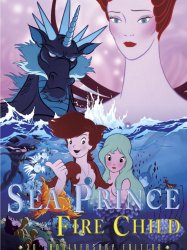 , 1h48
, 1h48Directed by Masami Hata
Origin Japon
Genres Drama, Fantasy, Animation, Romance
Themes Films about magic and magicians, Romeo and Juliet, Films based on plays, Films based on works by William Shakespeare
Actors Tōru Furuya, Tony Oliver, Mami Koyama, Keiko Han, Ikue Sakakibara, Jūkichi Uno
Roles Original Music Composer
Rating70%





À la suite d'une querelle entre les dieux, les peuples de l'eau et du feu ont été séparés à jamais. Un jour, Sirius, prince de l'eau, et Malta, princesse du feu, se rencontrent et tombent amoureux. Mais toute réconciliation entre les deux peuples semble impossible.
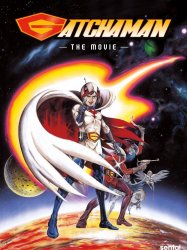
Gatchaman: The Movie (1978)
, 1h50Directed by Hisayuki Toriumi
Genres Science fiction, Action, Animation
Themes Superhero films, Space opera
Actors Katsuji Mori, Isao Sasaki, Yoku Shioya, Tōru Ohira
Roles Original Music Composer
Rating63%





Sosai X traveled millions of light years to reach the planet Earth and creates a mutant Berg Katse. 30 years later he is the leader of the terrorist organisation known as Galactor. They want to conquer the world. Since Galactor controls the mechanical monster "Turtle King," the nations of the world live in fear.
 Connection
Connection


